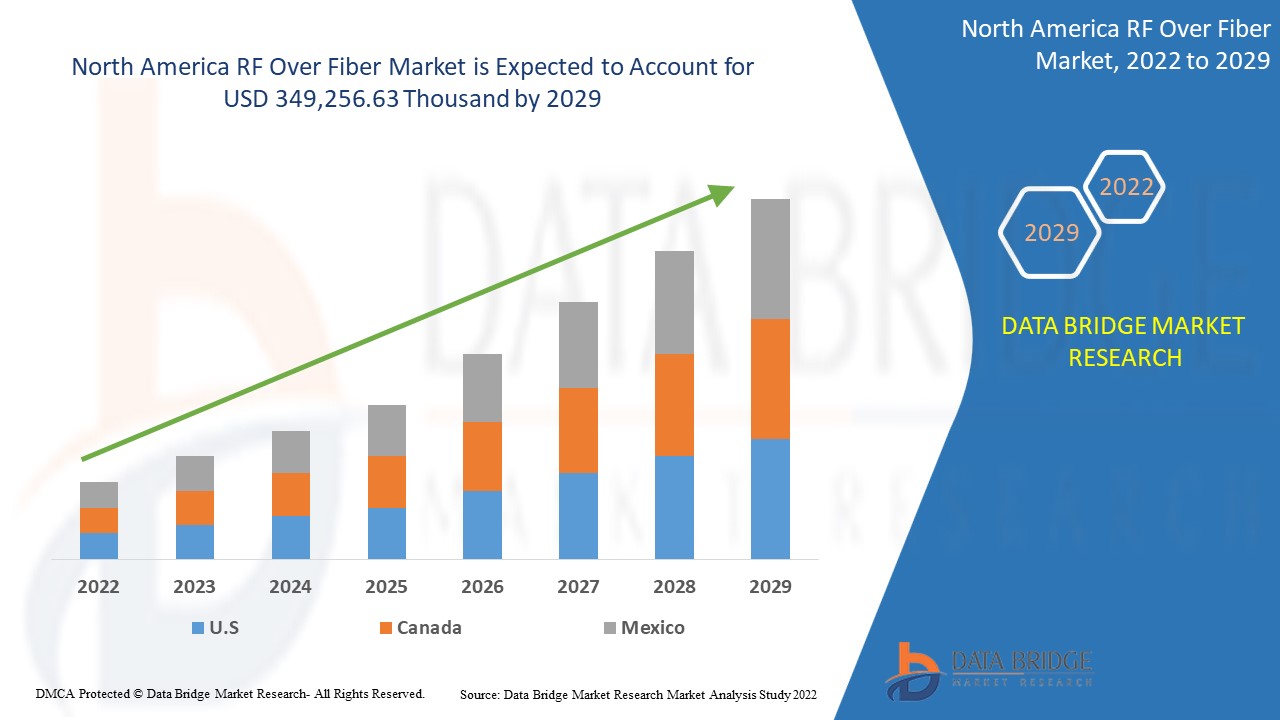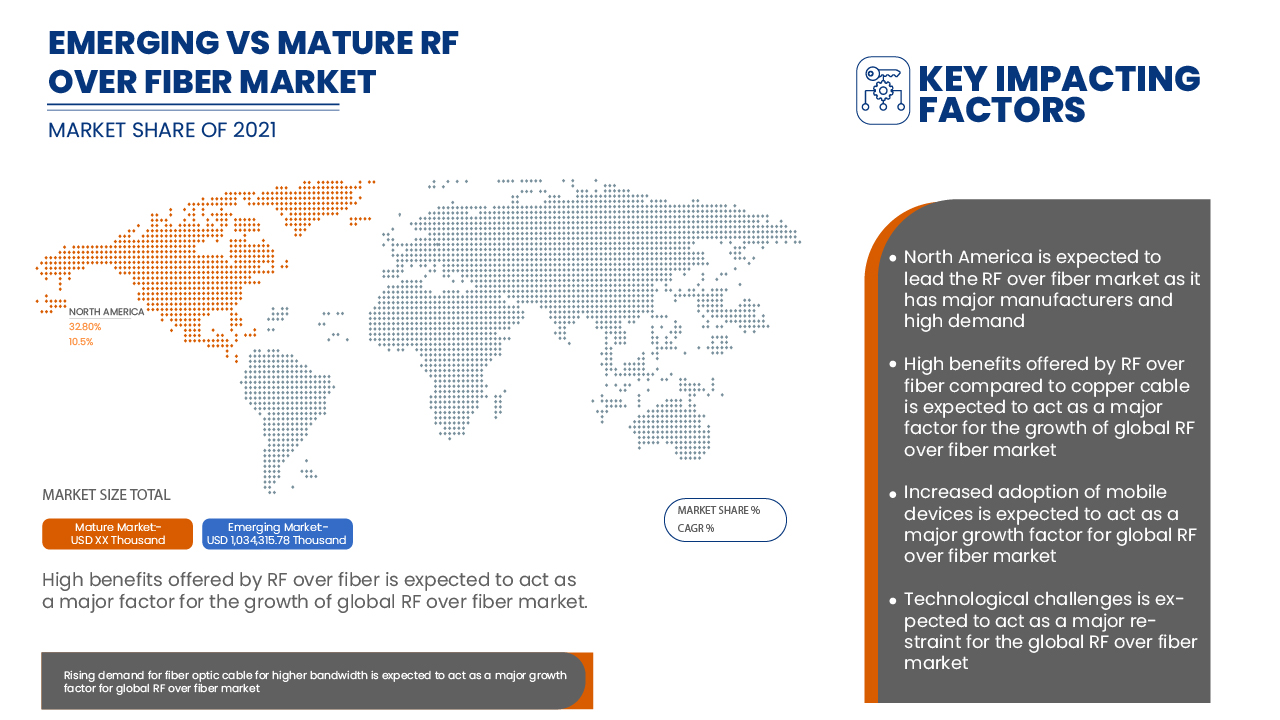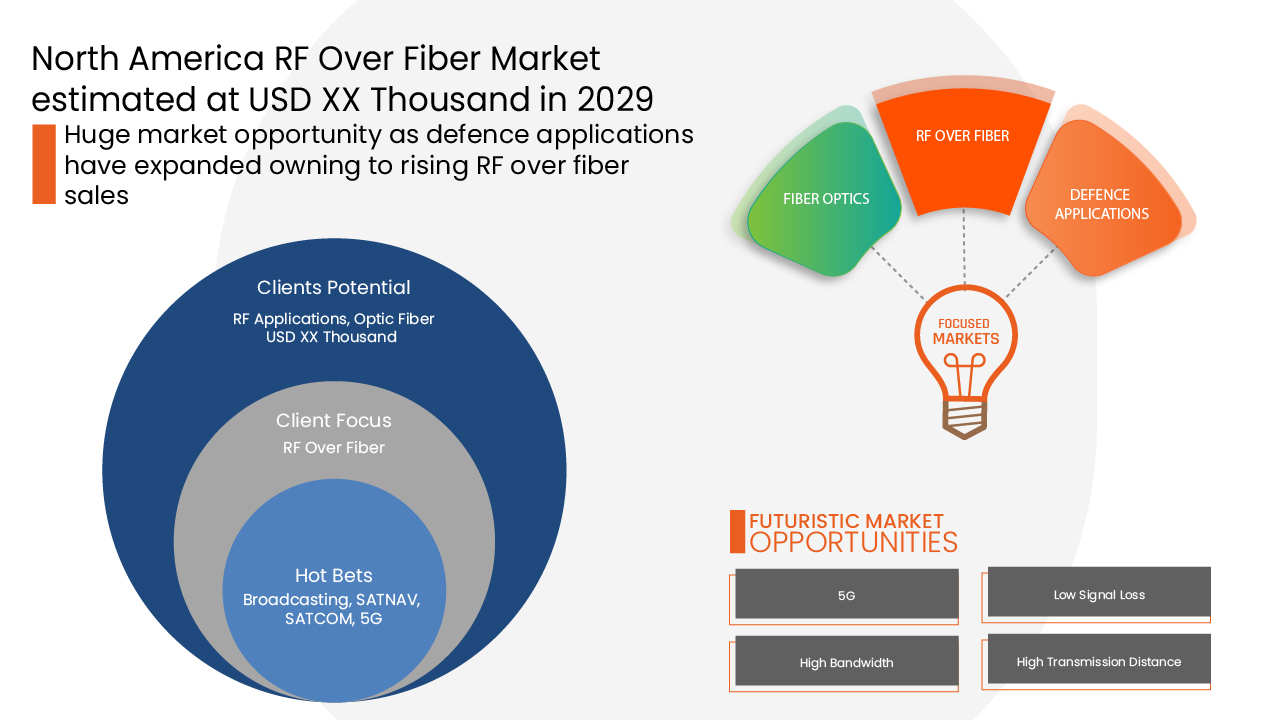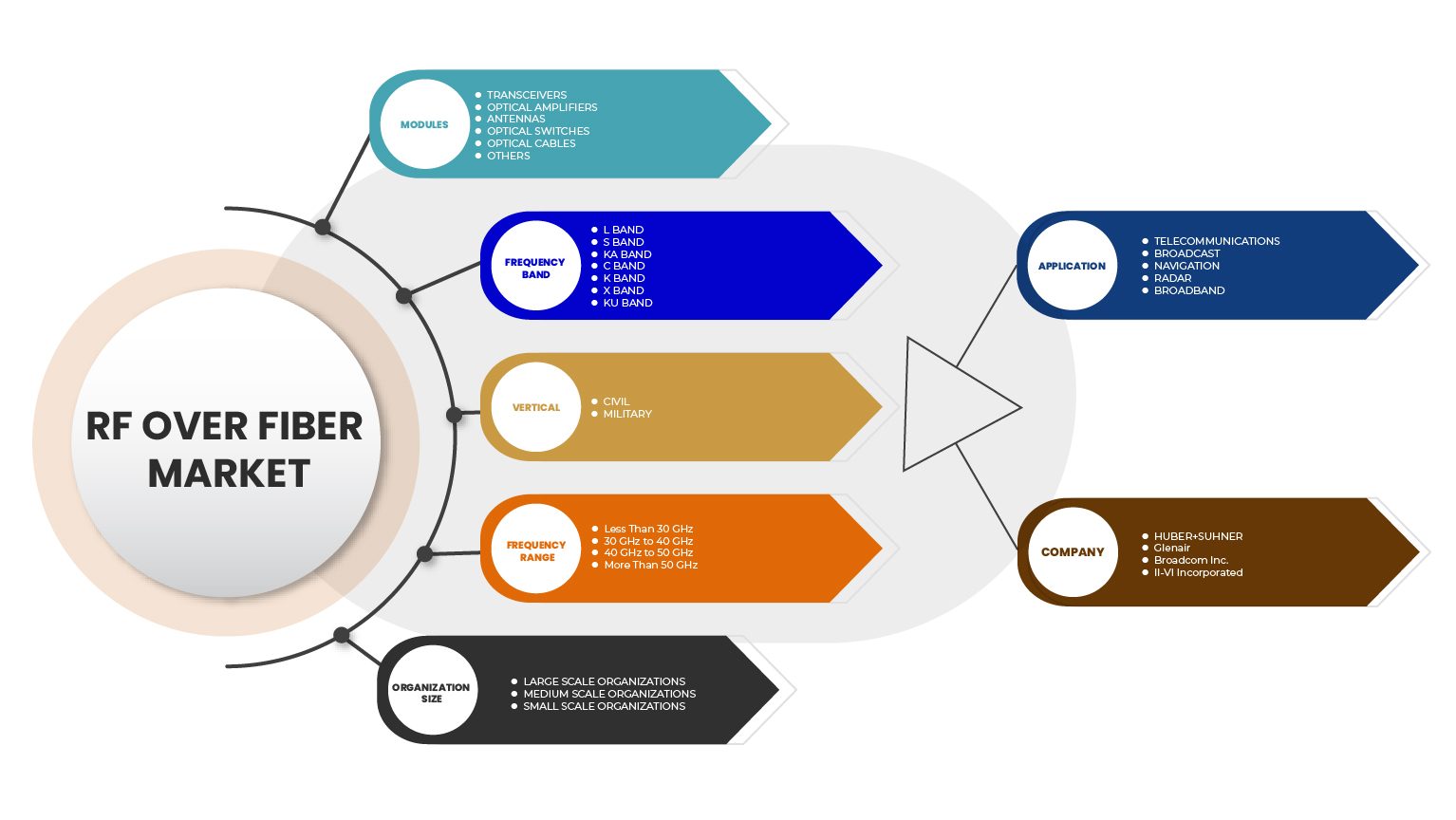북미 RF/RF 오버 파이버 시장, 모듈별(트랜시버, 광 증폭기 , 안테나, 광 스위치, 광 케이블 등), 주파수 대역(L 대역, S 대역, Ka 대역, C 대역, K 대역, X 대역, Ku 대역), 수직적(민간 및 군사), 주파수 범위(30GHz 미만, 30GHz~40GHz, 40GHz~50GHz, 50GHz 초과), 조직 규모(대규모 조직, 중규모 조직, 소규모 조직), 응용 분야(통신, 방송 , 내비게이션, 레이더 및 광대역) - 산업 동향 및 2029년까지의 예측.

시장 분석 및 규모
기술 개발로 인해 향상된 인터넷 서비스가 더 빠른 인터넷 연결에 대한 소비자 수요를 지원하여 광섬유 네트워크의 증가된 수를 증가시켰습니다. 이는 인구가 일상적인 요구 사항을 위해 디지털 플랫폼, 인터넷 서비스 및 온라인 서비스에 더 관심을 갖게 되면서 가능해졌습니다. 이러한 인터넷 보급률 증가로 광섬유 네트워크에서 효율적으로 제공되는 고대역폭, 고속 인터넷 서비스에 대한 수요가 크게 증가하고 있습니다. 따라서 광섬유 인프라의 성장이 증가함에 따라 광섬유를 통한 RF 수요가 증가합니다.


시장 성장을 주도하는 주요 요인은 소비자의 고화질 콘텐츠에 대한 수요 증가입니다. 광섬유 네트워크가 제공하는 높은 대역폭은 북미 RF 오버 파이버 시장을 활성화하는 주요 요인입니다. 그러나 인프라 구축에 필요한 높은 초기 비용이 시장 성장을 제한할 수 있습니다.
Data Bridge Market Research는 북미 RF over fiber 시장이 2029년까지 349,256.63천 달러에 도달할 것으로 예상하고 있으며, 예측 기간 동안 CAGR은 10.5%입니다. "트랜시버"는 가장 눈에 띄는 모듈 모드 세그먼트를 차지합니다. 북미 RF over fiber 시장 보고서는 또한 가격 분석, 특허 분석 및 기술 발전에 대한 심층적인 내용을 다룹니다.
|
보고서 메트릭 |
세부 |
|
예측 기간 |
2022년부터 2029년까지 |
|
기준 연도 |
2021 |
|
역사적 연도 |
2020 (2019-2014로 사용자 정의 가능) |
|
양적 단위 |
매출은 천 달러, 가격은 달러로 표시됨 |
|
다루는 세그먼트 |
모듈(트랜시버, 광 증폭기, 안테나 , 광 스위치, 광 케이블 등), 주파수 대역(L 대역, S 대역, Ka 대역, C 대역, K 대역, X 대역, Ku 대역), 수직(민간 및 군사), 주파수 범위(30GHz 미만, 30GHz~40GHz, 40GHz~50GHz, 50GHz 초과), 조직 규모(대규모 조직, 중규모 조직, 소규모 조직), 응용 분야(통신, 방송, 내비게이션, 레이더 및 광대역) |
|
적용 국가 |
미국, 캐나다, 멕시코 |
|
시장 참여자 포함 |
Broadcom, EMCORE Corporation, APIC Corporation, Optical Zonu Corp, Gooch & Housego PLC, ViaLite, Global Invacom, HUBER+SUHNER, Glenair, SEIKOH GIKEN CO., LTD., II-VI Incorporated, DEV Systemtechnik GmbH, Octane Wireless, Syntonics LLC, Intelibs, Inc., ETL Systems Ltd, Narda-MITEQ, RFOptic Ltd., Elkay, MicroComp Nordic AB, Microwave Photonic Systems, Inc. 등 |
시장 정의
광섬유를 통한 무선(RF over fiber)은 무선 신호를 사용하여 빛을 진폭 변조하고 광섬유 링크를 통해 전송하여 무선 액세스를 가능하게 하는 광섬유를 통한 아날로그 전송 기술입니다. 광섬유를 통한 무선 전송은 케이블 텔레비전(CATV) 네트워크 및 위성 기지국을 포함한 다양한 애플리케이션에 사용되지만 RoF라는 용어는 일반적으로 무선 액세스와 관련이 있습니다. 무선 신호는 RoF 시스템에서 브로드캐스트되기 전에 중앙 스테이션과 기지국 그룹 간에 광학 형태로 전송됩니다. 각 기지국은 기지국의 무선 범위 내에서 최소한 한 사용자의 모바일 스테이션과 통신하도록 구성됩니다.
북미 RF Over Fiber 시장 동향
이 섹션에서는 시장 동인, 이점, 기회, 제약 및 과제를 이해하는 것을 다룹니다. 이 모든 내용은 아래에서 자세히 설명합니다.
- 더 높은 대역폭을 위한 광섬유 케이블에 대한 수요 증가
광섬유 대역폭은 데이터 전송 속도와 감쇠 없이 데이터를 커버하는 거리가 높기 때문에 높습니다. 광섬유는 유리 와이어와 같은 다양한 물체를 통해 빛의 펄스로 데이터를 전송할 수 있으므로 데이터가 빛의 속도로 이동할 수 있습니다. 광 통신은 빛의 빔이 송신기에서 수신기로 정보를 전달하는 데 도움이 됩니다. 광 주파수는 일반적으로 적외선에 가깝고 약 1,000GHz입니다. 광섬유는 네트워크에 최고 품질의 데이터와 거의 신호 간섭을 제공하지 않습니다.
- 구리 케이블에 비해 광섬유 케이블의 효율적인 성능
구리 케이블 대역폭은 속도와 주파수 면에서 제한적입니다. 데이터가 전송되는 주파수 범위는 광섬유에서 훨씬 더 넓습니다. 광섬유는 한 지역에서 다른 지역으로 몇 분 만에 훨씬 더 많은 정보를 전송할 수 있는 반면 구리 케이블은 전기 신호를 사용하여 느리게 데이터를 전송하며, 광섬유는 빛 기반 신호를 통해 데이터를 전송합니다.
- 모바일 기기 채택 증가
소비자의 가처분 소득 증가와 고급 전자 제품에 대한 필요성이 가전제품 시장을 주도하고 있습니다. 소비자는 기술에 정통해지고 직장, 일상, 개인 엔터테인먼트 등에서 새로운 기술을 채택하고 있습니다. 스마트 기기는 향상된 제어, 기능 및 기타 기능으로 인해 시장에서 큰 점유율을 차지하고 있습니다.
- RFoF의 낮은 전력 소모 이점
전달되는 데이터 비트당 필요한 에너지는 시스템의 에너지 효율성을 결정할 수도 있습니다. 전력 소비량은 사용자당 전력 소비량 대 평균 액세스 속도(와트/Mbps)로 정의할 수 있으며, 액세스 네트워크 인프라의 전력 소비량은 네트워크 세분화를 사용하여 생성됩니다. 다양한 일반적인 유형의 하드웨어에 대한 장비 에너지 소비량에 대한 제조업체 데이터는 다양한 액세스 속도에 대한 시스템의 각 부분의 에너지 소비량을 계산하는 데 사용됩니다. 이러한 관점은 사용자 수와 사용자당 액세스 속도가 빠르게 증가함에 따라 전력 소비량의 증가를 예측하기 위한 더 나은 플랫폼을 제공합니다.
- RFoF의 쉬운 설치 및 유지 관리
대부분의 RoF 기술은 원격 안테나 장치(RAU)에서 로컬 발진기 및 관련 장비의 필요성을 제거합니다. 복잡하고 값비싼 장비는 RoF 시스템의 헤드엔드에서 유지 관리되므로 RAU가 더 단순해집니다. 고주파 전기 광학 변조기와 전자 장치는 비용이 많이 들고 전력 소모가 높기 때문에 CS(중앙국)에서는 피해야 합니다. 또한 생산 및 유지 관리 비용이 높기 때문에 다운링크 전송 시스템의 정교한 구현도 피해야 합니다. 헤드엔드에는 여러 RAU가 공유하는 변조 및 스위칭 장비가 있습니다. 이러한 구성의 결과로 RAU는 더 작고 가벼워져 시스템 설치 및 유지 관리 비용이 낮아집니다.
- RFoF의 기술적 한계
단일 모드 파이버 기반 RoF 시스템의 색 분산은 파이버 연결 길이를 제한하고 위상 비상관을 일으켜 더 높은 RF 캐리어 위상 노이즈를 초래할 수 있습니다. 모달 분산은 다중 모드 파이버 기반 RoF 시스템에서 사용 가능한 링크 대역폭과 거리를 심각하게 제한합니다. RoF 전송 방법은 아날로그이지만 분산되는 무선 시스템은 아날로그일 필요가 없으며(예: WLAN 및 UMTS) QAM(Quadrature Amplitude Modulation) 또는 OFDM(Orthogonal Frequency Division Multiplexing)과 같은 광범위한 다중 레벨 신호 변조 형식을 사용할 수 있습니다.
- 초기 투자 비용이 높음
RF over fiber 네트워크는 높은 대역폭, 고속, 경량과 같은 여러 가지 유익한 요소를 제공하지만 이 모든 것에는 높은 투자 비용이 따릅니다. 광섬유 네트워크 구성 요소는 매우 비쌉니다. 이것이 구리 케이블이 여전히 선호되는 이유이며, 비용은 네트워크 유형을 선택하는 데 중요한 요소입니다. 이는 북미 RF over fiber 시장의 성장을 제한할 수 있습니다. 트랜시버 및 기타 모든 구성 요소의 비용을 추가하면 전체 비용이 증가하여 회사의 높은 투자 비용으로 이어집니다. 통신 산업은 비용이 저렴하기 때문에 최종 사용자에게 구리 케이블 인프라를 사용하는 것을 선호합니다.
COVID-19 이후 북미 RF Over Fiber 시장에 미치는 영향
COVID-19는 북미 RF 오버 파이버 시장에 큰 영향을 미쳤습니다. 거의 모든 국가가 필수품 생산을 다루는 곳을 제외한 모든 생산 시설을 폐쇄하기로 했습니다. 정부는 COVID-19 확산을 막기 위해 비필수품 생산 및 판매 중단, 국제 무역 차단 등 엄격한 조치를 취했습니다. 이 팬데믹과 관련된 유일한 사업은 프로세스를 열고 실행할 수 있는 필수 서비스입니다.
코로나 이후 국제 무역을 촉진하려는 정부 정책으로 인해 북미 RF over fiber 시장의 성장이 증가하고 있습니다. 또한 RF over fiber가 비용과 경로를 최적화하는 데 제공하는 이점이 시장에서 RF over fiber에 대한 수요를 높이고 있습니다. 그러나 무역 경로와 관련된 혼잡 및 일부 국가 간의 무역 제한과 같은 요인이 시장 성장을 제한하고 있습니다. 팬데믹 동안 생산 시설이 폐쇄되면서 시장에 상당한 영향을 미쳤습니다.
제조업체는 COVID-19 이후 회복하기 위해 다양한 전략적 결정을 내리고 있습니다. 업체는 RF over fiber에 관련된 기술을 개선하기 위해 여러 연구 개발 활동을 수행하고 있습니다. 이를 통해 회사는 시장에 고급적이고 정확한 솔루션을 제공할 것입니다. 또한 국제 무역을 촉진하기 위한 정부 이니셔티브가 시장 성장으로 이어졌습니다.
최근 개발 사항
- 2022년 3월, Broadcom Inc.는 통합 트랜스 임피던스 증폭기(TIA)와 하이 스윙 레이저 드라이버가 있는 100G/레인 광학 PAM-4 DSP PHY의 시연을 발표했습니다. 이 제품은 112G PAM-4 DSP 플랫폼을 기반으로 하며, 최고 수준의 CMOS 통합과 더 낮은 전력 소비로 뛰어난 성능을 제공합니다. 따라서 이 회사는 시장에서 제품 포트폴리오를 확장할 수 있을 것입니다.
- 2021년 11월, HUBER+SUHNER는 4G 및 5G 연결을 강화할 수 있는 Rail Antenna를 출시했습니다. 이 새로운 SENCITY Rail MIMO+ Rooftop 안테나는 고급 이중 편파 안테나 기술을 사용하여 기차 전체에서 잠재적인 4G 및 5G 데이터를 증가시킵니다. 이를 통해 회사는 시장에서 제품 포트폴리오를 확장할 수 있을 것입니다.
북미 RF Over Fiber 시장 범위
북미 RF over fiber 시장은 모듈, 주파수 대역, 수직, 주파수 범위 및 애플리케이션을 기준으로 세분화됩니다. 이러한 세그먼트 간의 성장은 산업의 빈약한 성장 세그먼트를 분석하고 사용자에게 핵심 시장 애플리케이션을 식별하기 위한 전략적 결정을 내리는 데 도움이 되는 귀중한 시장 개요와 시장 통찰력을 제공하는 데 도움이 됩니다.
모듈별로
- 트랜시버
- 광 증폭기
- 안테나
- 광학 스위치
- 광 케이블
- 기타
모듈을 기준으로 북미 RF 광섬유 시장은 트랜시버, 광 증폭기, 안테나, 광 스위치, 광 케이블 등으로 구분됩니다.
주파수 대역별
- L 밴드
- S 밴드
- 카 밴드
- C 밴드
- K 밴드
- X 밴드
- 쿠 밴드
주파수 대역을 기준으로 북미 RF 광섬유 시장은 L 대역, S 대역, Ka 대역, C 대역, K 대역, X 대역, Ku 대역으로 구분됩니다.
수직으로
- 예의 바른
- 군대
수직적 기준으로 볼 때, 북미 RF 광섬유 시장은 민간 및 군용으로 구분됩니다.
주파수 범위별
- 30GHz 미만
- 30GHz ~ 40GHz
- 40GHz ~ 50GHz
- 50GHz 이상
주파수 범위를 기준으로 북미 RF 광섬유 시장은 30GHz 미만, 30GHz~40GHz, 40GHz~50GHz, 50GHz 이상으로 구분됩니다.
조직 규모별
- 대규모 조직
- 중규모 조직
- 소규모 조직
북미 RF 광섬유 시장은 조직 규모에 따라 대규모 조직, 중규모 조직, 소규모 조직으로 구분됩니다.
응용 프로그램으로
- 통신
- 방송
- 항해
- 레이더
- 광대역

북미 RF 광섬유 시장은 응용 분야를 기준으로 통신, 방송, 내비게이션, 레이더 및 광대역으로 구분됩니다.
북미 RF Over Fiber 시장 지역 분석/통찰력
북미 RF 오버 파이버 시장을 분석하고, 위에 참조된 대로 국가, 모듈, 주파수 대역, 업종, 주파수 범위 및 애플리케이션별로 시장 규모에 대한 통찰력과 추세를 제공합니다.
북미 RF 광섬유 시장 보고서에서 다루는 국가는 미국, 캐나다, 멕시코입니다.
미국은 북미 RF 오버 파이버 시장에서 가장 빠르게 성장하는 국가가 될 가능성이 높습니다. 기술 개발의 최전선에 있는 미국은 시장의 지배력으로 평가받고 있습니다.
보고서의 국가 섹션은 또한 현재 및 미래 시장 추세에 영향을 미치는 개별 시장 영향 요인과 시장 규제의 변화를 제공합니다. 하류 및 상류 가치 사슬 분석, 기술 추세 및 포터의 5가지 힘 분석, 사례 연구와 같은 데이터 포인트는 개별 국가의 시장 시나리오를 예측하는 데 사용되는 몇 가지 포인터입니다. 또한 북미 브랜드의 존재 및 가용성과 지역 및 국내 브랜드와의 대규모 또는 희소한 경쟁으로 인해 직면한 과제, 국내 관세의 영향 및 무역 경로가 국가 데이터의 예측 분석을 제공하는 동안 고려됩니다.
경쟁 환경 및 북미 RF Over Fiber 시장 점유율 분석
북미 RF over fiber 시장 경쟁 구도는 경쟁자에 대한 세부 정보를 제공합니다. 포함된 세부 정보는 회사 개요, 회사 재무, 창출된 수익, 시장 잠재력, 연구 개발 투자, 새로운 시장 이니셔티브, 북미 지역, 생산 현장 및 시설, 생산 용량, 회사의 강점과 약점, 제품 출시, 제품 폭 및 범위, 애플리케이션 우세입니다. 위에 제공된 데이터 포인트는 북미 RF over fiber 시장과 관련된 회사의 초점에만 관련이 있습니다.
북미 RF 오버 파이버 시장의 주요 기업으로는 Broadcom, EMCORE Corporation, APIC Corporation, Optical Zonu Corp, Gooch & Housego PLC, ViaLite, Global Invacom, HUBER+SUHNER, Glenair, SEIKOH GIKEN CO., LTD., II-VI Incorporated, DEV Systemtechnik GmbH, Octane Wireless, Syntonics LLC, Intelibs, Inc., ETL Systems Ltd, Narda-MITEQ, RFOptic Ltd., Elkay, MicroComp Nordic AB, Microwave Photonic Systems, Inc. 등이 있습니다.
연구 방법론: 북미 RF Over Fiber 시장
데이터 수집 및 기준 연도 분석은 대규모 샘플 크기의 데이터 수집 모듈을 사용하여 수행됩니다. 이 단계에는 다양한 소스와 전략을 통해 시장 정보 또는 관련 데이터를 얻는 것이 포함됩니다. 여기에는 과거에 수집한 모든 데이터를 미리 검토하고 계획하는 것이 포함됩니다. 또한 다양한 정보 소스에서 발견되는 정보 불일치를 검토하는 것도 포함됩니다. 시장 데이터는 시장 통계 및 일관된 모델을 사용하여 분석하고 추정합니다. 또한 시장 점유율 분석 및 주요 추세 분석은 시장 보고서의 주요 성공 요인입니다. 자세한 내용을 알아보려면 분석가에게 전화를 요청하거나 문의 사항을 드롭 다운하세요.
DBMR 연구팀이 사용하는 주요 연구 방법론은 데이터 마이닝, 시장에 대한 데이터 변수의 영향 분석, 주요(산업 전문가) 검증을 포함하는 데이터 삼각 측량입니다. 이 외에도 데이터 모델에는 공급업체 포지셔닝 그리드, 시장 타임라인 분석, 시장 개요 및 가이드, 회사 포지셔닝 그리드, 특허 분석, 가격 분석, 회사 시장 점유율 분석, 측정 표준, 북미 대 지역 및 공급업체 점유율 분석이 포함됩니다. 연구 방법론에 대해 자세히 알아보려면 문의를 남겨 산업 전문가에게 문의하세요.
SKU-
세계 최초의 시장 정보 클라우드 보고서에 온라인으로 접속하세요
- 대화형 데이터 분석 대시보드
- 높은 성장 잠재력 기회를 위한 회사 분석 대시보드
- 사용자 정의 및 질의를 위한 리서치 분석가 액세스
- 대화형 대시보드를 통한 경쟁자 분석
- 최신 뉴스, 업데이트 및 추세 분석
- 포괄적인 경쟁자 추적을 위한 벤치마크 분석의 힘 활용
연구 방법론
데이터 수집 및 기준 연도 분석은 대규모 샘플 크기의 데이터 수집 모듈을 사용하여 수행됩니다. 이 단계에는 다양한 소스와 전략을 통해 시장 정보 또는 관련 데이터를 얻는 것이 포함됩니다. 여기에는 과거에 수집한 모든 데이터를 미리 검토하고 계획하는 것이 포함됩니다. 또한 다양한 정보 소스에서 발견되는 정보 불일치를 검토하는 것도 포함됩니다. 시장 데이터는 시장 통계 및 일관된 모델을 사용하여 분석하고 추정합니다. 또한 시장 점유율 분석 및 주요 추세 분석은 시장 보고서의 주요 성공 요인입니다. 자세한 내용은 분석가에게 전화를 요청하거나 문의 사항을 드롭하세요.
DBMR 연구팀에서 사용하는 주요 연구 방법론은 데이터 마이닝, 시장에 대한 데이터 변수의 영향 분석 및 주요(산업 전문가) 검증을 포함하는 데이터 삼각 측량입니다. 데이터 모델에는 공급업체 포지셔닝 그리드, 시장 타임라인 분석, 시장 개요 및 가이드, 회사 포지셔닝 그리드, 특허 분석, 가격 분석, 회사 시장 점유율 분석, 측정 기준, 글로벌 대 지역 및 공급업체 점유율 분석이 포함됩니다. 연구 방법론에 대해 자세히 알아보려면 문의를 통해 업계 전문가에게 문의하세요.
사용자 정의 가능
Data Bridge Market Research는 고급 형성 연구 분야의 선두 주자입니다. 저희는 기존 및 신규 고객에게 목표에 맞는 데이터와 분석을 제공하는 데 자부심을 느낍니다. 보고서는 추가 국가에 대한 시장 이해(국가 목록 요청), 임상 시험 결과 데이터, 문헌 검토, 재생 시장 및 제품 기반 분석을 포함하도록 사용자 정의할 수 있습니다. 기술 기반 분석에서 시장 포트폴리오 전략에 이르기까지 타겟 경쟁업체의 시장 분석을 분석할 수 있습니다. 귀하가 원하는 형식과 데이터 스타일로 필요한 만큼 많은 경쟁자를 추가할 수 있습니다. 저희 분석가 팀은 또한 원시 엑셀 파일 피벗 테이블(팩트북)로 데이터를 제공하거나 보고서에서 사용 가능한 데이터 세트에서 프레젠테이션을 만드는 데 도움을 줄 수 있습니다.














